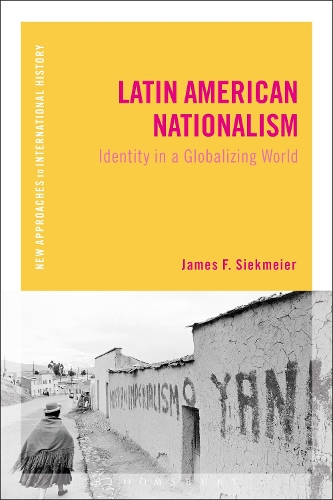
Latin American Nationalism: Identity in a Globalizing World
(Paperback)
Available Formats
Publishing Details
Latin American Nationalism: Identity in a Globalizing World
By (Author) James F. Siekmeier
Bloomsbury Publishing PLC
Bloomsbury Academic
7th September 2017
United Kingdom
Classifications
Professional and Scholarly
Non Fiction
General and world history
History of the Americas
Politics and government
Regional / International studies
Nationalism and nationalist ideologies and movements
History and Archaeology
320.54098
Physical Properties
Paperback
312
Width 156mm, Height 234mm
440g
Description
With ethnic and class-based national movements taking center stage in countries like Bolivia and Venezuela, nationalism has proven to be one of the most durable and important movements in Latin America. In understanding the history of these nationalisms, we can understand how Latin America relates to the rest of the world. As Latin America inserts itself into a rapidly globalizing world, understanding the changing nature of national identify and nationalism is key. By tracing the important historical origins of present-day Latin American nationalism, this book gives readers a thorough introduction to the subject. Only by understanding how nationalism came to be such an important social and political force, can we understand its significance today. In turn, understanding Latin American nationalism helps us understand how Latin America shapes, and is shaped by, a rapidly globalizing world.
Reviews
Valuable as an up-to-date summary and reference-point which asks timely questions about the nature of states and their effectiveness in fostering internal cohesion and international order ... For many scholars and students in the contemporary world, this exploration of the interaction between the two highly powerful forces of nationalism and globalisation will surely resonate. * The English Historical Review *
Latin American Nationalism is an outstanding study of an important yet often ignored topic. In an area where the nation-state has not always been strong, nationalism was slower to develop and has had considerable difficulty resisting the onslaught of globalization. This is a must-read for all students of Latin America and its economic and social development. * W. Michael Weis, Illinois Wesleyan University, USA *
In his sweeping analysis of Latin American nationalism over two centuries, Siekmeier forcefully argues for its power and distinctiveness while allowing for its rich tapestry of overlapping and sometimes conflicting varieties, including its elite and non-elite manifestations. A much-needed reappraisal of the nation in the age of globalization. * Alan McPherson, University of Oklahoma, author of The Invaded: How Latin Americans and their Allies Fought and Ended U.S. Occupations *
James Siekmeier provides a useful perspective on the distinctiveness of Latin American nationalism and a timely examination of the relationship between nationalism and globalisation. * Halbert Jones, Director, Rothermere American Institute, University of Oxford, UK *
In this lively and wide-ranging book, historian James F. Siekmeier asserts that Latin American nationalism has the curious nature of being simultaneously weak and yet strongly proclaimed at the same time (p. 33). The book grapples with this seeming contradiction by providing a broad historical overview and panoramic case studies that successfully convey the varied nature of nationalism in Latin America ... ideal for introductory and survey courses. * Hispanic American Historical Review *
Author Bio
James F. Siekmeier is Associate Professor of History at West Virginia University, USA.
